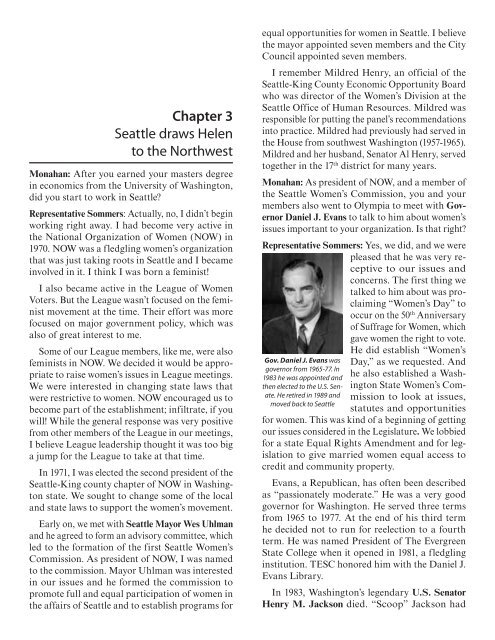Helen Sommers: An Oral History
Helen Sommers: An Oral History
Helen Sommers: An Oral History
You also want an ePaper? Increase the reach of your titles
YUMPU automatically turns print PDFs into web optimized ePapers that Google loves.
Chapter 3<br />
Seattle draws <strong>Helen</strong><br />
to the Northwest<br />
Monahan: After you earned your masters degree<br />
in economics from the University of Washington,<br />
did you start to work in Seattle?<br />
Representative <strong>Sommers</strong>: Actually, no, I didn’t begin<br />
working right away. I had become very active in<br />
the National Organization of Women (NOW) in<br />
1970. NOW was a fledgling women’s organization<br />
that was just taking roots in Seattle and I became<br />
involved in it. I think I was born a feminist!<br />
I also became active in the League of Women<br />
Voters. But the League wasn’t focused on the feminist<br />
movement at the time. Their effort was more<br />
focused on major government policy, which was<br />
also of great interest to me.<br />
Some of our League members, like me, were also<br />
feminists in NOW. We decided it would be appropriate<br />
to raise women’s issues in League meetings.<br />
We were interested in changing state laws that<br />
were restrictive to women. NOW encouraged us to<br />
become part of the establishment; infiltrate, if you<br />
will! While the general response was very positive<br />
from other members of the League in our meetings,<br />
I believe League leadership thought it was too big<br />
a jump for the League to take at that time.<br />
In 1971, I was elected the second president of the<br />
Seattle-King county chapter of NOW in Washington<br />
state. We sought to change some of the local<br />
and state laws to support the women’s movement.<br />
Early on, we met with Seattle Mayor Wes Uhlman<br />
and he agreed to form an advisory committee, which<br />
led to the formation of the first Seattle Women’s<br />
Commission. As president of NOW, I was named<br />
to the commission. Mayor Uhlman was interested<br />
in our issues and he formed the commission to<br />
promote full and equal participation of women in<br />
the affairs of Seattle and to establish programs for<br />
equal opportunities for women in Seattle. I believe<br />
the mayor appointed seven members and the City<br />
Council appointed seven members.<br />
I remember Mildred Henry, an official of the<br />
Seattle-King County Economic Opportunity Board<br />
who was director of the Women’s Division at the<br />
Seattle Office of Human Resources. Mildred was<br />
responsible for putting the panel’s recommendations<br />
into practice. Mildred had previously had served in<br />
the House from southwest Washington (1957-1965).<br />
Mildred and her husband, Senator Al Henry, served<br />
together in the 17 th district for many years.<br />
Monahan: As president of NOW, and a member of<br />
the Seattle Women’s Commission, you and your<br />
members also went to Olympia to meet with Governor<br />
Daniel J . Evans to talk to him about women’s<br />
issues important to your organization. Is that right?<br />
Representative <strong>Sommers</strong>: Yes, we did, and we were<br />
pleased that he was very receptive<br />
to our issues and<br />
concerns. The first thing we<br />
talked to him about was proclaiming<br />
“Women’s Day” to<br />
occur on the 50 th <strong>An</strong>niversary<br />
of Suffrage for Women, which<br />
gave women the right to vote.<br />
Gov. Daniel J. Evans was<br />
governor from 1965-77. In<br />
1983 he was appointed and<br />
then elected to the U.S. Senate.<br />
He retired in 1989 and<br />
moved back to Seattle<br />
He did establish “Women’s<br />
Day,” as we requested. <strong>An</strong>d<br />
he also established a Washington<br />
State Women’s Commission<br />
to look at issues,<br />
statutes and opportunities<br />
for women. This was kind of a beginning of getting<br />
our issues considered in the Legislature . We lobbied<br />
for a state Equal Rights Amendment and for legislation<br />
to give married women equal access to<br />
credit and community property.<br />
Evans, a Republican, has often been described<br />
as “passionately moderate.” He was a very good<br />
governor for Washington. He served three terms<br />
from 1965 to 1977. At the end of his third term<br />
he decided not to run for reelection to a fourth<br />
term. He was named President of The Evergreen<br />
State College when it opened in 1981, a fledgling<br />
institution. TESC honored him with the Daniel J.<br />
Evans Library.<br />
In 1983, Washington’s legendary U .S . Senator<br />
Henry M . Jackson died. “Scoop” Jackson had
















